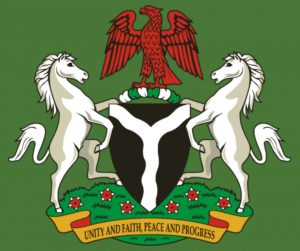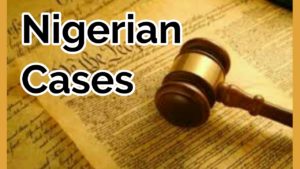Mallam Nasir Ahmad El-Rufai v The House Of Representatives and National Assembly of Nigeria – (2014) LCN/7686 (CA): The substance of this case led the Court of Appeal to the interpretation and implication of section 88(2) of the 1999 constitution to the effect that the legislature can only summon for investigation in respect to matters which it has power to make law, and for the purpose of exposing corruption in execution of administrative duty.
It also establishes the principle that the court will only intervene in a matter where there is interference or likely interference with the citizen’s civil right.

Recommended: Mojekwu v Ejikeme: Fact, Issues and decision of the court
Issues For Determination in El-Rufai V House of Representative
a. The jurisdiction of the court to hear premature matters
b. The power of the legislature to summon investigation only in respect to matters which it has power to legislate upon, and matters relating to exposition of corruption and inefficiency in the administration of public duty.
Recommended: Differences between a deed and an agreement

Facts of the Case of El-Rufai V House of Representative
The plaintiff was summoned by the House in respect of a publication which was termed defamatory of which he made with respect to the House’s investigation on NITEL privatization. The plaintiff was on his way to a conference in South African when he received from the clerk of the House summoning him to appear before the house for making and circulating a defamatory statement on a matter which their committee were investigating. He then referred the letter to his Counsel to take the necessary legal measures. Action was instituted in the High Court.
The plaintiff thereon contends that the House were acting as a judge in their own cause, owing to the fact that the matter which his act of defamation is alleged in respect to, is one which the House has seise of. The House was therefore the complainant as well as the judge in the matter, if he were to appear for investigation before them. In fact, the content of the letter of summon served on the plaintiff suggests that they have adjudged him guilty already when it read, “…the defamatory statements written and circulated by you…”
Recommended: Countries with the best judicial system in the world

Decision of the court in Mallam Nasir Ahmad El-Rufai v The House Of Representatives and National Assembly of Nigeria – (2014) LCN/7686 (CA)
The plaintiff’s matter was struck out by the trial court for being premature. The trial court based its reasoning on the fact that the plaintiff was yet to answer to the summon of the House, therefore there has been none of his rights that was breached yet. It is after he answers to the summon and consequently, any of his rights becomes affected, that is when he can approach the court for redress. The legislature was merely carrying out their constitutional duty and should be allowed to do so.
Meanwhile, the defendant contended that the court lacked the jurisdiction to entertain the matter. His contention was based on the provision of section 3 of the Legislative Houses (Powers and Privileges) Act Cap 208, 1999 Laws of the Federation. The section prohibits the institution of civil or criminal proceeding against a member of the Legislative House regarding anything said or done before the House or a committee set up in the House as it relates to bills, motions, petitions or questions brought before the House.
On appeal to the Court of Appeal, the Court of Appeal in determining the appeal highlighted certain relevant sections of the constitution which empowers the legislature to make laws, and those which empowers then to summon for investigation in respect to the subject matters which they have the power to legislate upon, and for the purpose of exposing corruption and inefficiency in the execution of laws within areas of its legislative competence, as provided in section 88(2) of the 1999 constitution.
Also see: Advantages and Disadvantages of Being a Lawyer
Following the provision of section 88(2) of the constitution, Court of Appeal posed a question as to whether in the instant case, the act if the House summoning the plaintiff to appear before the Ethics and Privileges Committee for the purpose of answering question in respect to his alleged defamatory conduct, was a subject matter which the House has legislative competence or for the purpose of exposing corruption in a public administrative duty or disbursement of public fund. Court of Appeal answered this question in the negative.
The court further pointed out that the content of the letter summoning the plaintiff indicates that the matter has already been determined. Furthermore, the combined perusal of section 24, 30 and 32 of the Legislative Houses (Powers and Privileges) Act Cap 208 Laws of the Federation, reads to the effect that where a person has been alleged to have committed an offence, the procedure prescribed by the law requires the Speaker or the Senate President as the case may be, to inform the Attorney General of the Federation in writing for the proper prosecution of the person, since defamation committed by a House Member against the House amounts to a crime by the virtue of section 24 (c) of the Legislative Houses (Powers and Privileges) Act.
The Court of Appeal stated that the provision of the law in this regard I clear, thus, there was nothing for the Ethics and Privileges Committee to Investigate. The court relied on similar relevant decisions to the effect that the House only have the power to summon citizens for investigation only within the provision of section 88 (2) of the constitution. The court added that the judiciary is not concerned with the internal affairs of the legislature as long as it is in compliance with the provisions of the constitution and other relevant laws.
The Court of Appeal held on the substance of the appeal that the High Court ordinarily has jurisdiction to entertain the suit but only upon the existence of interference or a likely interference with the plaintiff’s civil rights. In this case, the plaintiff did not show more than a mere invitation for investigation. Court of Appeal thereon upheld the decision of the High Court to the effect that the suit was premature. The plaintiff’s case was therefore liable to be struck out as was accordingly done by the High Court.

Edeh Samuel Chukwuemeka, ACMC, is a lawyer and a certified mediator/conciliator in Nigeria. He is also a developer with knowledge in various programming languages. Samuel is determined to leverage his skills in technology, SEO, and legal practice to revolutionize the legal profession worldwide by creating web and mobile applications that simplify legal research. Sam is also passionate about educating and providing valuable information to people.